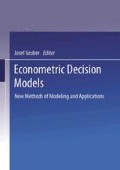Abstract
A measure of interdependence of a system of equations facilitates e.g. Monte Carlo studies of small sample properties of estimators and tests.
To find such a measure we reorder the equation system such that the sum of the absolute values above the the main diagonal of the coefficient matrix is maximal. If in the reordered system there are only zeroes below the main diagonal, the system is recursive and the degree of interdependence is zero. We use the ‘degree of linearity’ proposed by Helmstädter 1965 for an equivalent problem (triangulation of an input-output matrix) to measure the degree of interdependence. The measure is refined later: First the classes of interdependence are constructed (using the transitive closure operation) and then the measures of interdependence are computed within these classes. This means block-triangulation of the coefficient matrix and corresponds to reordering the equation system so as to achieve a blockrecursive system of equations.
Access this chapter
Tax calculation will be finalised at checkout
Purchases are for personal use only
Preview
Unable to display preview. Download preview PDF.
References
BARTHELEMY, J.P.; MONJARDET, B.: The Median Procedure in Cluster Analysis and Social Choice Theory, Mathematical Social Sciences 1 (1981), pp. 235–267
BARTNICK, J.: Bewertung und Kompromißbildung, Eine Weiterentwicklung der Nutzwertanalyse mit Beispielen aus der Raumplanung, Baden-Baden 1983
BARTNICK, J.: An A* Algorithm for the Aggregation of Preference Relations, Methods of Operations Research 59 (1989), pp. 311–322
BARTNICK, J.: On the Number of Optimal Solutions of the Linear Ordering Problem, Extended Abstract, Methods of Operations Research 63 (1990), pp. 425–426
BARTNICK, J: Ein Maß für die Interdependenz ökonometrischer Gleichungssysteme und Verfahren zur Ermittlung blockrekursiver Strukturen. Diskussionsbeitrag Nr. 166 des Fachbereichs Wirtschaftswissenschaft, FernUniversität Hagen 1991
BARTNICK, J.: Aggregation of individual preference relations to a collective cardinal evaluation (to appear in Methods of Operations Research)
BODIN, L.: Recursive Fix-Point Estimation. Theory and Applications, University of Uppsala, Department of Statistics, Selected Publications, vol. 32, 1974
DON, F.J.H.; GALLO, G.M.: Solving Large Sparse Systems of Equations in Econometric Models, Journal of Forecasting 6 (1987), pp. 167–180
GAREY, M.R.; JOHNSON, D.S.: Computers and Intractability — A Guide to the Theory of NP-Completeness, San Francisco 1979
GARBELY, M.; GILLI, M.: Two approaches in reading model interdependencies, in: ANCOT, J.P. (ed.), Analysing the Structure of Econometric Models, The Hague, Boston, Lancaster 1984, chapter 2
GRUBER, J.: Ökonometrische Modelle des Cowles-Commission-Typs: Bau und Interpretation, Hamburg-Berlin 1968
GRUBER, J.: Zur Interdependenz ökonometrischer Gleichungssysteme, in: FROHN, J. (ed.), Makroökonometrische Modelle für die Bundesrepublik Deutschland, Göttingen 1978, pp. 185–213
HELMSTÄDTER, E.: Ein Maß für das Ergebnis der Triangulation von Input-Output-Matrizen, Jahrbücher für Nationalökonomie und Statistik 177 (1965), pp. 456–463
KORTE, B.; OBERHOFER, W.: Zwei Algorithmen zur Lösung eines komplexen Reihenfolgeproblems, Unternehmensforschung 12 (1968), pp. 217–231
KORTE, B.; OBERHOFER, W.: Zur Triangulation von Input-Output-Matrizen, Jahrbücher für Nationalökonomie und Statistik 182 (1969), pp. 398–433
KRUPP, R.: Interdependenz und Zerlegbarkeit ökonometrischer Modelle, Jahrbücher für Nationalökonomie und Statistik 190 (1976), pp. 105–120
REINELT, G.: The Linear Ordering Problem: Algorithms and Applications, Berlin 1985
REINGOLD, E.M., NIEVERGELT, J.; DEO, N.: Combinatorial algorithms: Theory and Practice, Englewood Cliffs, New Jersey 1977
RÖDDING, W.: Aggregation of Individual Preferences, Göttingen 1975
SZPILRAJN, E.: Sur l’extension de l’ordre partiel, Fundamenta Mathematicae 16 (1930), pp. 386–389
TUSHAUS, U.: Aggregation binärer Relationen in der qualitativen Datenanalyse, Königstein/Ts. 1983
WESSELS, H.: Triangulation und Blocktriangulation von Input-Output-Tabellen und ihre Bedeutung, Deutsches Institut für Wirtschaftsforschung, Beiträge zur Strukturforschung, Heft 63, Berlin 1981
Author information
Authors and Affiliations
Editor information
Editors and Affiliations
Rights and permissions
Copyright information
© 1991 Springer-Verlag Berlin Heidelberg
About this paper
Cite this paper
Bartnick, J. (1991). Optimal triangulation of a matrix and a measure of interdependence for a linear econometric equation system. In: Gruber, J. (eds) Econometric Decision Models. Lecture Notes in Economics and Mathematical Systems, vol 366. Springer, Berlin, Heidelberg. https://doi.org/10.1007/978-3-642-51675-7_28
Download citation
DOI: https://doi.org/10.1007/978-3-642-51675-7_28
Publisher Name: Springer, Berlin, Heidelberg
Print ISBN: 978-3-540-54373-2
Online ISBN: 978-3-642-51675-7
eBook Packages: Springer Book Archive

